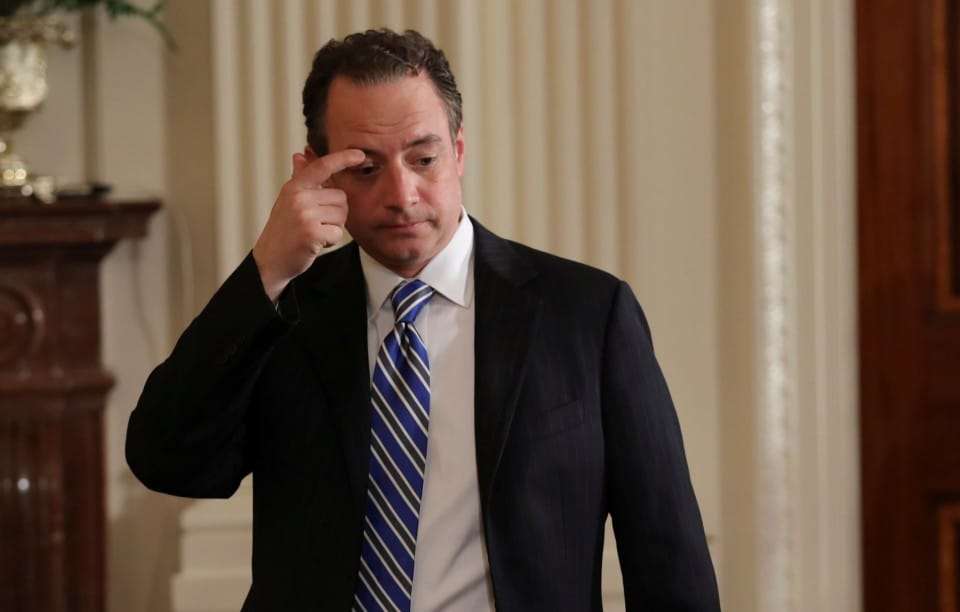The Volokh Conspiracy
Mostly law professors | Sometimes contrarian | Often libertarian | Always independent
White House Chief of Staff Reince Priebus on changes to libel law

Some commenters have noted that White House Chief of Staff Reince Priebus spoke Sunday about possible changes to libel law - I agree that this would be a big story if any specific changes were called for, but at this point it's just too hard to tell what, if anything, will ever be proposed. Here's the interview with ABC's George Karl:
KARL: So I want to move on, before you go, we have a segment coming up with Ann Coulter and Robert Reich. Of course, there's a big controversy at Berkeley over freedom of speech.
I want to ask you about two things the president has said on related issues.
First of all, there was what he said about opening up the libel laws, Tweeting, "The failing 'New York Times' has disgraced the media world, gotten me wrong for two solid years. Change the libel laws."
That would require, as I understand it, a constitutional amendment.
Is he really going to pursue that?
Is that something he wants to pursue?
PRIEBUS: I think it's something that we've looked at and how that gets executed or whether that goes anywhere is a different story. But when you have articles out there that have no basis or fact and we're sitting here on 24-7 cable companies writing stories about constant contacts with Russia and all these other matters that (INAUDIBLE)…
KARL: Do you think the president should be…
PRIEBUS: - no basis at all…
KARL: - to sue "The New York Times."..
PRIEBUS: I think that…
KARL: - for stories he doesn't like?
PRIEBUS: Here's what I think. I think that newspapers and news agencies need to be more responsible with how they report the news. I am so tired…
KARL: I don't think anybody would disagree with that. It's about…
PRIEBUS: But everyone…
KARL: - whether or not the president should have a right to sue them.
PRIEBUS: And I already answered the question. I said this is something that is being looked at. But it's something that as far as how it gets executed, where we go with it, that's another issue. But I think this is a frustration of unnamed sources, of things that the FBI has told me personally…
KARL: Yes.
PRIEBUS: - is complete BS, written in a newspaper article, in my office, one-on-one, this here is not true.
KARL: And…
PRIEBUS: And guess what?
But it's sitting there on the front page.
So how is it possible?
And what do we have?
Twenty-four seven cable about a story about intelligence that the actual intelligence agency says is not true.
KARL: And then just…
PRIEBUS: But yet we deal with it every day.
This sounds interesting, because of course changes to libel law may well substantially affect what is safe to say in public debate. But the trouble is that there's just no specifics here. "I think it's something that we've looked at and how that gets executed or whether that goes anywhere is a different story" - not terribly specific. And the original "change the libel laws" isn't terribly specific, either.
Government officials can already win libel cases if they show that someone is saying something (1) false (2) about them (3) that injures their reputation and (4) the speaker knows the statement is false, or is at least quite likely false. (This is famously but misleading called the "actual malice" standard though it doesn't actually have much to do with "malice" in the plain English sense of the word.) This, of course, is a hard standard to meet, especially because of the requirement of knowledge of falsehood or likely falsehood.
Some - most prominently, Justice Byron White (a Kennedy appointee who was generally seen as a centrist on the Supreme Court) - have argued that this standard should be lowered to negligence: Under that standard, which is already used in many compensatory damages claims by private figures, a plaintiff can win if the defendant has said false and reputation-injury things about the plaintiff and didn't reasonably investigate the allegations. This is not a ridiculous proposal (White was not a ridiculous man), though I'd be reluctant to adopt it.
Still, I have no evidence that this is quite what President Trump had in mind, or whether he had anything concrete in mind, rather than just expressing dissatisfaction with the current state of affairs. This was, after all, a political statement at a political event, and one fairly tangential to Trump's overall platform; it wouldn't be surprising if he didn't have a worked-out agenda on it.
So as this point, we don't have a concrete proposal, or even (as with the flag-burning reference) a specific indication of what a proposal would look like if there were a proposal. What we have is basically grumbling, and grumbling that seems to deliberately stress the absence of any concrete suggestion that "goes anywhere." This makes it hard to offer much useful commentary, and makes it hard for me to get particularly concerned, until something more specific is raised.


Hide Comments (0)
Editor's Note: We invite comments and request that they be civil and on-topic. We do not moderate or assume any responsibility for comments, which are owned by the readers who post them. Comments do not represent the views of Reason.com or Reason Foundation. We reserve the right to delete any comment for any reason at any time. Comments may only be edited within 5 minutes of posting. Report abuses.
Please to post comments
Mute this user?
Ban this user?
Un-ban this user?
Nuke this user?
Un-nuke this user?
Flag this comment?
Un-flag this comment?